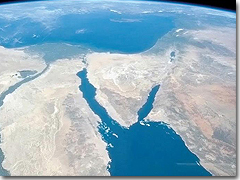 |
|
An Israeli Suez Canal |
|
|
| |
 *Talk about channel without me - the author of the project. But still nice!
Israel can change the world of shipping, and erase its desert.
In technological terms, Israel has always been absurdly ambitious.
Irrigating its desert, designing microprocessors, developing drones, shooting down rockets, being – by far – the smallest country to launch its own satellites: Israel is a superpower of science and engineering. So proposing Israel undertake absurdly complex infrastructure projects isn’t altogether absurd.
Israel is working with China to build a railway from Eilat to the Mediterranean; it’s intended to serve as an overland alternative to the Suez Canal. Ships will arrive on one end and unload; the cargo will be rolled to the other end and loaded onto another boat to continue its trip around the world. It certainly makes sense for Israel to have a parallel to the Suez canal: needless to say, as the Red Sea approaches the Med, it breaks into two prongs. The Suez is at one tip, Eilat is at the other.
What Israel ought to do is dig its own canal, from Eilat to Ashkelon. This would be very complicated, very difficult, and very, very expensive.
It would take a long time. But it is doable, and the upside would be tremendous. The Suez Canal is 193 km long; a trans-Israel canal would have to be about 100 km longer. And it wouldn’t have the benefit of a preexisting waterway to dredge, as the Suez did, or a basically flat landscape to cross, as the Suez does. It would follow the lowlands along the border with Jordan, and then begin to move west about 80 miles north of Eilat, near Ein Yahav. It would be a much bigger job than the Suez was.
The Suez Canal was built by a French corporation; construction began in 1859 and lasted 10 years. So the question is, how much simpler is construction in 2015 than it was in the 1860s? Remember: the first car wasn’t invented (by Austrian Jew Siegfried Marcus) until 1870 – a year after the Suez Canal was completed. The art of canal building has changed more in the past 150 years than the Compagnie Universelle du Canal Maritime de Suez could have imagined. We live in a post-Chunnel world; excavation has been mastered.
Last year, about 20,000 ships passed through the Suez Canal, producing a total of $5.5 billion in revenue for Egypt. As Asian economies expand, and Europe’s Asian-trade deficit starts to balance, traffic will only increase.
The new Eilat-Med rail line will cost $4.9b.; Egypt is digging a secondary canal, running parallel to half of the existing Suez, at a cost of $8.4b. A trans-Israel canal would be much more expensive. But if it could match the current rate of traffic through the Suez, its construction could cost $55b. dollars and it would pay for itself in 10 years.
Matching Suez traffic doesn’t mean stealing Egypt’s business: the Suez Canal is only one lane wide, and can handle fewer than 50 ships a day. A trans-Israel canal would be a valuable supplement, and it could do some of the things the Suez can’t, like support oil tankers that exceed the Suez’s depth and width. Obviously – a canal built today could fit today’s shipping needs better than a canal built 150 years ago. It would increase the Red Sea shipping lane’s importance to the petroleum trade; currently it moves 2.5 percent of global oil output. Being an even greater transit focus – with routes running along both sides of the Sinai Peninsula – would benefit both Israel and Egypt’s economies.
Sharm el-Sheikh, as the center of the two transit branches, could develop into a new global shipping hub. Egyptian representatives should be invited to sit on the new canal’s board.
And a trans-Israel, trans-Negev canal could play a crucial role in Israel’s development separate from shipping – it could change the face of Israeli irrigation. An artificial channel running through the heart of Zion’s remaining dry and thirsty land, combined with Israel’s world-leading desalination techniques, could make southern Israel bloom. Which will be vital as Israel’s population inevitably expands south; people love mountains so long as they’re not barren.
The canal could even help refill the Dead Sea. A new rail line is nice, but it isn’t enough, not in the long term. A trans-Israel canal would be an incredible and incredibly difficult undertaking – but Israel is equipped to handle it. Israel itself was an incredible and incredibly difficult undertaking. Israel’s economy, its roles in the energy market, in world trade, in globalizing technology are expanding every day.
It’s time for Israel to make itself a two-ocean nation.
The author is a columnist for National Review Online; he has written about geopolitics for publications such as The Wall Street Journal and The Weekly Standard.
A source: jpost.com
|
|
|
|
| |
|
|
|
|
 In the page beginning In the page beginning |
|
 |
|
|
|
 |
|
 |
|
|
|
|
|

|
|